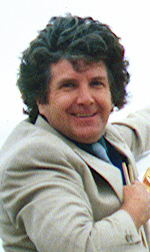Peter Powell (kite) facts for kids
Peter Trevor Powell (born around 1932 – died in 2016) was a clever English inventor who became famous for making kites. In 1972, he created a special kind of kite that you could steer using two lines, which was a big deal at the time!
Contents
Who Was Peter Powell?
Peter Powell was born in a city called Gloucester in England. He grew up there and later became known for his amazing kite designs. He loved making things, and his passion led him to create kites that were different from any others.
The Amazing Steerable Kite
Peter Powell's most famous invention was his steerable kite. Before his design, most kites just flew wherever the wind took them. But Peter's kite could be controlled! It had two lines, like reins on a horse, that allowed the flyer to guide the kite through the sky. This meant people could make their kites do cool tricks and stunts.
How the Kite Was Built
Peter's kites were made with strong but light materials.
- Early kites used spars (the stiff parts that give the kite its shape) made from a wood called Gonystylus.
- Later, he switched to lighter aluminium tubes.
- Even later, he used strong glass fibre spars, which are still used in many modern kites today.
The Special Tail
One of the coolest parts of Peter Powell's kites was their long, hollow tail. This tail was made of a plastic material called polyethylene. When the wind blew, the tail would inflate, making it look really impressive as the kite flew. This tail wasn't just for show; it also helped the kite stay steady and balanced in the air, especially when performing stunts.
Peter Powell's Legacy
Peter Powell's steerable kites changed the world of kite flying. They made it possible for people to do exciting aerial displays and inspired many other kite designers. His invention helped create a whole new sport of stunt kite flying that is still popular today.
Peter Powell passed away in 2016 in Cheltenham, England, when he was 83 years old. He left behind a legacy of innovation and fun for kite enthusiasts everywhere.
 | James B. Knighten |
 | Azellia White |
 | Willa Brown |


